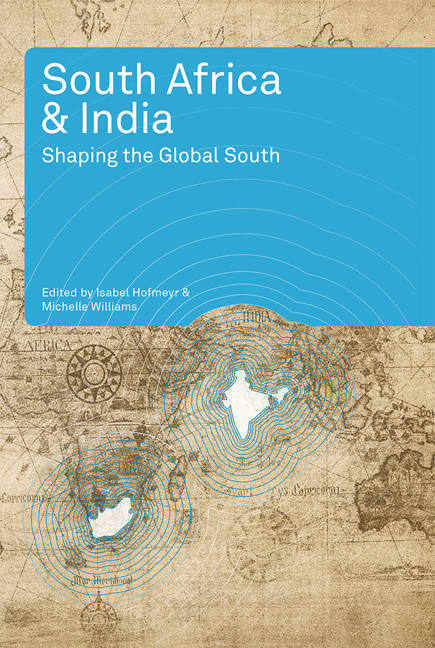Book contents
- Frontmatter
- Contents
- Acknowledgements
- Abbreviations and Acronyms
- Introduction
- Historical Connections
- Socio-political Comparisons
- Chapter 6 Renaissances, African and Modern: Gandhi as a Resource?
- Chapter 7 Democratic Deepening in India and South Africa
- Chapter 8 Local Democracy in Indian and South African Cities: A Comparative Literature Review
- Chapter 9 Reimagining Socialist Futures in South Africa and Kerala, India
- Chapter 10 Labour, Migrancy and Urbanisation in South Africa and India, 1900–60
- Conclusion
- Notes and References
- About the Authors
- Index
Chapter 7 - Democratic Deepening in India and South Africa
from Socio-political Comparisons
Published online by Cambridge University Press: 21 April 2018
- Frontmatter
- Contents
- Acknowledgements
- Abbreviations and Acronyms
- Introduction
- Historical Connections
- Socio-political Comparisons
- Chapter 6 Renaissances, African and Modern: Gandhi as a Resource?
- Chapter 7 Democratic Deepening in India and South Africa
- Chapter 8 Local Democracy in Indian and South African Cities: A Comparative Literature Review
- Chapter 9 Reimagining Socialist Futures in South Africa and Kerala, India
- Chapter 10 Labour, Migrancy and Urbanisation in South Africa and India, 1900–60
- Conclusion
- Notes and References
- About the Authors
- Index
Summary
Introduction
India and South Africa are arguably the most successful cases of democratic consolidation in the developing world. With the exception of a brief authoritarian interlude – the emergency of 1975–77 in India – neither country has experienced a serious challenge to democratic rule since transition, and the likelihood of democratic reversal or even destabilisation, especially when compared to Latin America, East Asia and the rest of Africa, is remote. Democracy, as in Linz and Stepan's (1996) famous definition of democratic consolidation, has become the only game in town. Moreover, democracy has made a real difference. In India, it has helped forge a nation from the most heterogeneous social fabric in the world. In South Africa, democratic politics and constitutional rule have managed a transition from white minority to black majority rule with minimal conflict. That this has been achieved against a social backdrop of extreme social exclusions (the caste system in India) and the worst maldistribution of wealth in the world (South Africa) only underscores the achievements at hand.
But if both have fared well in consolidating democratic institutions, including the rule of law, democratic deepening has proven much more elusive. Thus, even as formal constitutional democracy has been consolidated, there is little evidence of an increased capacity of subordinate groups to have an effective role in shaping public policy. More specifically, both the depth of social actors who enjoy effective political power and the range of issues over which democratic power extends have not expanded, despite both countries’ formal commitments to promoting social rights. In many respects, of course, this simply reflects the classic dilemma of capitalist democracy: most investment decisions are made by private property holders and the power of the market simply trumps the power of the ballot box. But this argument is too facile and in any event fails to account for another, and in many ways more fundamental, problem, namely deficits in the democratic process itself.
- Type
- Chapter
- Information
- South Africa and IndiaShaping the Global South, pp. 150 - 175Publisher: Wits University PressPrint publication year: 2011



